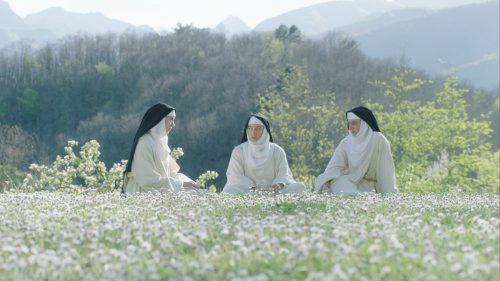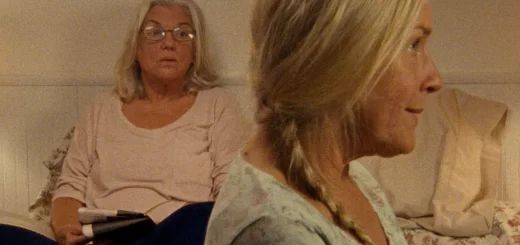LA Film Fest 2017: The Little Hours, by David Bax
It will be hard to avoid reviews of Jeff Baena’s The Little Hours that accuse it of being a “feature length sketch.” It’s not an entirely unfair charge, given the basic comedic presence of a film that takes place in the 14th century but has all its characters speaking in modern, vulgar language. Certainly, it’s funny to see nuns gossiping about each other like shallow sorority sisters and then yelling at the convent’s field hand, “Don’t fucking talk to us!” But if that were the only joke, it would wear thin quickly. Luckily, Baena has more in mind.
The Little Hours is based on The Decameron, the collection of tales by Giovanni Boccaccio printed in the 1350s. Specifically, it focuses on one tale (also included in Pasolini’s The Decameron film) of a convent in which a fugitive agrees to hide out as long as he follows the priest’s instructions of pretending to be deaf and dumb. Soon, the nuns, thinking the young man unable to hear or speak, turn him first into a repository for all of their fears and desires and then eventually into a more or less willing sex slave.
Fiction though The Little Hours may be, Drunk History is a fitting comparison for most of the comedy. Certainly, the cast seems to have been pulled from the same pool of talented, funny comic actors like Molly Shannon, Alison Brie, Kate Micucci, Dave Franco, John C. Reilly, Adam Pally, Fred Armisen, Jemima Kirke, the great Lauren Weedman and a cameo from Paul Reiser, plus a couple of actual vets of the Comedy Central series, Aubrey Plaza and Nick Offerman. And I’m sure Baena would prefer to be compared to that show and not theatrical flops like Year One and Your Highness, which also come to mind.
As mentioned above, Baena goes deeper than the film’s logline might suggest. Boccaccio wrote his bawdy tales in the vernacular of the time. But language that is seven centuries old can’t help but sound elevated as it becomes fixed in antiquity. But when Franco says “We’re gonna fuck” or Brie refers to the other sisters as “all of these bitches,” the effect is closer to what Boccaccio likely intended.
Neither The Decameron nor The Little Hours is content to merely shock and titillate, though. It’s not an accident that these petty, cruel and self-centered characters are nearly all members and devotees of the church. They have ostensibly dedicated their lives to something bigger than themselves in the search of some sort of spiritual purity, defined here (as it often is) as sexual abstinence and heteronormativity. These are people who spend most of their free time lying, drinking and abusing one another while putting on airs of moral superiority. It is, then, deliciously satisfying (though it may be a turnoff to some) when Baena tilts into full-on carnal pagan nutso territory in the climax. Just remember that, while it’s making you guffaw, it’s also engaged in some religious and sexual satire that’s still potent hundreds of years later.





























